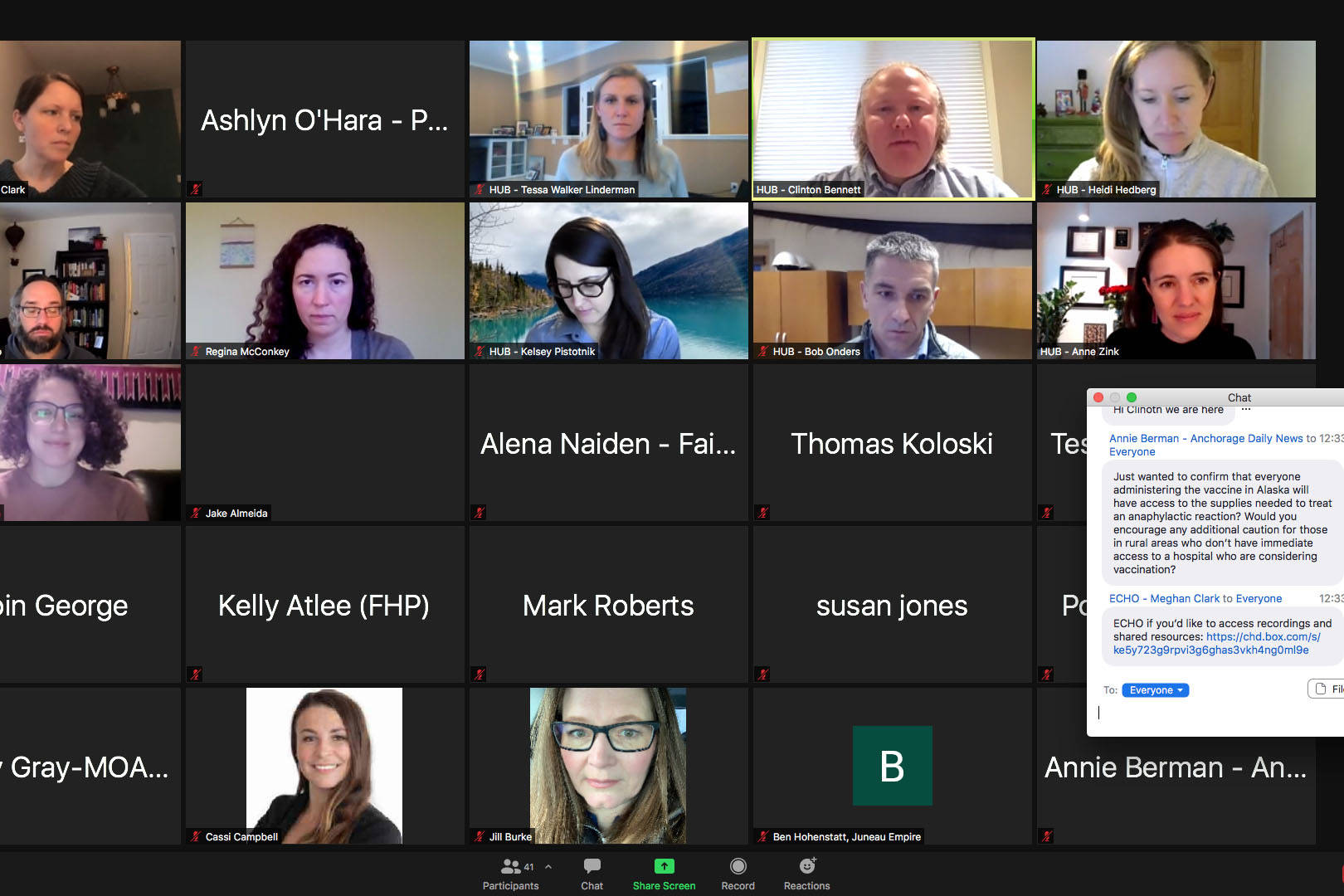The first doses of Moderna’s COVID-19 vaccine arrived in Alaska on Monday, just one week after Pfizer’s.
The Alaska Department of Health and Social Services (DHSS) has anticipated that Moderna’s vaccine will be logistically easier to handle and to distribute to communities throughout the state. The state is expecting to receive 26,800 initial doses of the Moderna vaccine, which include allocations for the Indian Health Service. As with Pfizer, second doses of the Moderna vaccine are being held at the federal level and will be sent to states at a later date.
The U.S. Food and Drug Administration authorized Moderna’s vaccine last Friday for emergency use. Because the Pfizer and Moderna vaccines have been granted Emergency Use Authorization (EUA), they cannot be mandated by government entities or private businesses.
Central Peninsula Hospital External Affairs Director Bruce Richards said Monday that CPH would be having their second vaccine clinic for hospital employees on Tuesday. Richards also said that the hospital would not be putting in for any of the Moderna vaccines because they will likely have enough Pfizer doses for their employees. Because the two vaccines have different logistical requirements, such as storage and when the second dose must be administered, CPH is trying to stick with one manufacturer.
Both the Pfizer and Moderna vaccines, which both have efficacy rates of more than 90%, require two doses to be fully effective. The first and second doses of Pfizer’s vaccine must be administered 21 days apart, while the first and second doses of Moderna’s vaccine must be administered 28 days apart.
The two vaccines have different storage requirements, however, some of which have proved logistically challenging for DHSS. While Alaska’s existing vaccine storage infrastructure can easily accommodate Moderna’s vaccine, Pfizer’s vaccine requires ultra-cool storage. Moderna’s vaccine must be shipped at -4 degrees Fahrenheit and is stable while thawing in a refrigerator for 30 days and at room temperature for 12 hours. In contrast, the Pfizer vaccine must be shipped at -94 degrees Fahrenheit and can only be stored at refrigerated temperatures for five days. Last week, Alaska’s Chief Medical Officer Dr. Anne Zink said that some communities have opted to wait for the arrival of the Moderna vaccine.
The state confirmed a failed shipment of 20 doses of the Pfizer vaccine to Ketchikan. Though the doses are equipped with thermometers that transmit the storage temperature of the doses in transit, the temperature was found to be out of the acceptable range upon arriving in Ketchikan. As a result, the state had to resend 20 new doses that arrived successfully.
Alaska considers federal guidance from the CDC Advisory Committee on Immunization Practices (ACIP) when determining allocation. During a Monday press briefing, DHSS gave further insight into who the next people to be vaccinated in Alaska will be. Alaska considers federal guidance from the CDC Advisory Committee on Immunization Practices (ACIP) when determining allocation. Vaccine allocation is divided into three phases. Those phases are divided into sub-phases. Those sub-phases are then divided further into tiers.
Phase 1a, Tier 1 includes long-term care facility staff and residents and hospital-based front-line health care workers. Long-term care facilities include skilled nursing facilities, assisted living homes and Department of Corrections infirmaries providing care similar to that of assisted living.
Phase 1a, Tier 2 includes front-line EMS and Fire Service personnel frequently exposed to COVID-19 patients, community health aides/practitioners and health care workers providing vaccinations.
Vaccinations for people in Phase 1a, Tiers 1 and 2 began on Dec. 15.
On Dec. 17, the Alaska Vaccine Allocation Advisory Committee met and unanimously determined who would be included in Phase 1a, Tier 3.
Phase 1a, Tier 3 includes workers in health care settings who are at highest risk of contracting COVID-19 and who are essential to the health care infrastructure. To qualify for this tier, workers must have direct patient contact or direct contact with infectious materials from patients. They must also provide essential services that cannot be offered remotely and provide a service that cannot be postponed without detrimental impact to a patient’s health outcome.
Vaccinations for people in Phase 1a, Tier 3 are expected to begin on Jan. 4.
So far, five adverse reactions have been reported among people who have received the Pfizer vaccine in Alaska. Two were reported at Bartlett Regional Hospital in Juneau. One was reported at Fairbanks Memorial Hospital in Fairbanks and two were reported at Providence Alaska Medical Center. As of Dec. 20, 5,674 initial doses of Pfizer’s COVID-19 vaccine had been administered in Alaska, meaning .09% of people who have received the vaccine in Alaska have experienced adverse reactions to it.
Two of the five reactions were identified as anaphylaxis, one of which was serious enough to warrant hospitalization. The other three cases were mild and were not considered anaphylaxis. In all five cases, symptoms have resolved. The individual who was hospitalized has been discharged and is “doing well.”
In all situations, symptoms developed during the 15 to 30 minute observation period following vaccination. Hospitals are required to have medicine on hand to treat potential allergic reactions. DHSS is encouraging anyone who experiences an adverse reaction to report it to the CDC via the Vaccine Adverse Event Reporting System (VAERS).
According to DHSS, the CDC had received six case reports of anaphylaxis following the Pfizer vaccine in the country. As of Dec. 19, 272,001 doses had been administered, meaning roughly .002% of people nationwide who have received the vaccine have experienced anaphylaxis.
More information about the COVID-19 vaccine in Alaska and DHSS’ vaccine distribution plan can be found on DHSS’ website at http://covidvax.alaska.gov/.
Reach reporter Ashlyn O’Hara at ashlyn.ohara@peninsulaclarion.com.

